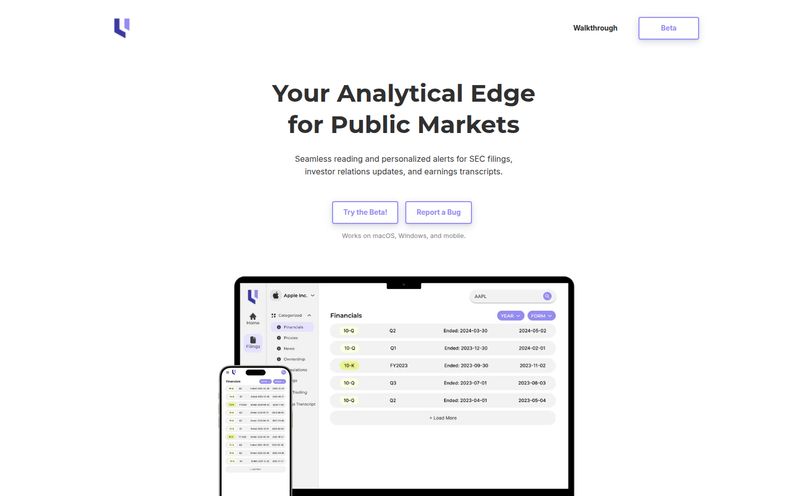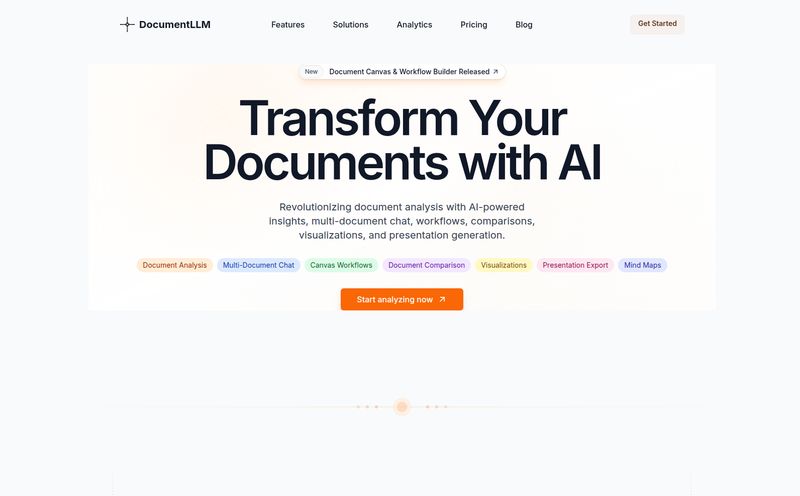I have a confession. I’ve probably wasted literal weeks of my life scrubbing through audio waveforms. You know the drill. You’re looking for that perfect 15-second clip for an Instagram Reel or a YouTube intro. The client wants something “upbeat but not cheesy,” “emotional but with a strong build.” It’s a nightmare. You end up listening to the same three royalty-free tracks until your ears bleed, and the search for the right mood or BPM feels like searching for a needle in a haystack made of other, slightly different needles.
So, when a tool like SONOTELLER pops onto my radar, my ears perk up. Another AI tool, you say? Sure. They’re a dime a dozen these days. But this one claims to be an “AI engine for music analysis, tagging, and understanding.” It’s not just generating music; it’s listening to it. Intelligently. And that, my friends, is a whole different ballgame.
So What is This SONOTELLER Thing, Really?
Imagine you could hand a song to an expert—someone with a PhD in musicology and an encyclopedic knowledge of pop culture—and ask them to break it down for you. That’s the pitch for SONOTELLER. It’s an experimental AI designed to ingest a piece of music and spit out a comprehensive analysis. We’re talking everything from the obvious stuff like genre and BPM to the more nuanced details like mood, instrumentation, and even a summary of the lyrics.
For anyone managing a large music catalog, from a bedroom DJ to a major record label, this is the holy grail. The tedious, manual process of tagging tracks could suddenly become automatic. It’s like having a super-powered intern who never sleeps, never complains, and has a perfect ear.

Visit SONOTELLER
Putting it to the Test: My First Spin
The interface is dead simple. A clean landing page with a single search bar prompts you to drop in a song or YouTube link. For my first run, I decided to throw it a bit of a curveball—not some straightforward pop song, but "D.A.N.C.E." by Justice. It's electronic, but it has that soulful, Jackson 5-esque vocal sample. How would the AI classify it?
I pasted the link, hit enter, and was greeted by a slick little loading animation. The site warns that analysis can take up to a minute, which feels like an eternity in our instant-gratification world, but hey, good things take time. As I waited, I couldn’t help but wonder what it was doing. Was it transcribing the lyrics? Analyzing the frequency spectrum? Cross-referencing with a massive database? Probably all of the above.
The Full Breakdown: What SONOTELLER Uncovered
When the results came in, I was genuinely impressed. It wasn’t just a couple of generic tags. It was a full-blown report card for the song, a rich data profile that went way deeper than I expected.
More Than Just Genre and BPM
Of course, it nailed the basics. It identified the BPM and the key of the song, which is standard fare for most music software. But its genre analysis was more layered. It didn't just say 'Electronic'; it pulled out tags like 'Electro House' and 'Nu-Disco,' which is spot on. It also identified the instruments—synthesizers, bass, drums, and vocals. This is the kind of metadata that makes searching a library for a specific feel so much easier.
The Mood, The Vibe, The Feeling
This is where things get interesting for me as a content guy. Finding music that matches a specific mood is critical for audience engagement. SONOTELLER provided mood tags like 'Energetic,' 'Funky,' and 'Feel-good.' This is a massive time-saver. Instead of listening to hundreds of tracks to find something “funky,” I could theoretically just search my AI-tagged library. It also provides a short, AI-generated summary of the song's overall vibe, which is a nice touch.
Lyric Analysis and That All-Important Brand Safety
Another killer feature is its ability to analyze lyrics. It provides a summary of what the song is about and, crucially, flags any explicit content. For anyone creating content for clients or platforms with strict guidelines (hello, YouTube monetization), this is huge. No more accidentally using a track with a hidden F-bomb in a corporate video. The AI acts as a first-line-of-defense for brand safety, which is frankly invaluable.
The Secret Weapon: Finding the “Golden Minute”
Okay, this is the feature that made me sit up straight. SONOTELLER claims to identify the "golden minute" of a song. What’s that? It’s the most energetic, catchy, and memorable part of the track—the bit that’s most likely to hook a listener. For the TikTok and Reels generation, this is everything. We're constantly looking for the drop or the hook. SONOTELLER points you directly to it. This single feature could revolutionize how social media managers, video editors, and advertisers find and use music clips. It’s brilliant.
Who is This Actually For?
While any music lover could have fun with this, I see a few key groups who would get serious value from SONOTELLER, especially once its API is integrated into their workflows.
- Music Supervisors & Content Creators: The ability to quickly find tracks based on mood, instruments, and that 'golden minute' is a massive workflow improvement.
- Record Labels & Publishers: Imagine being able to automatically tag your entire back catalog with this level of detail. It would make licensing and discovery infinitely more efficient. A&R departments could even use it to quickly analyze new demo submissions.
- DJs & Playlist Curators: Building a set or a playlist based on a specific vibe or energy level becomes a data-driven process. You could find seamless transitions by matching key, BPM, and mood.
The Good, The Bad, and The Beta
No tool is perfect, especially one that’s still experimental. So let's get real about the pros and the cons as they stand right now.
What I'm Excited About
The depth of the analysis is the clear winner here. The automatic tagging is a genuine problem-solver. And I can’t stop thinking about the potential of the golden minute feature. The fact that there's an API available shows they’re thinking big, targeting professional workflows and not just a consumer gimmick. The option for customizable tagging also means you could adapt it to your own internal systems. Thats smart.
Where It Skips a Beat
It's still in beta, and you can feel it. The one-minute wait for analysis can be a drag if you’re trying to process multiple songs. Also, a key limitation right now is that the public-facing tool only works with YouTube links. To analyze your own audio files, you need to use their API. This makes sense from a development standpoint but limits its immediate use for someone wanting to, say, analyze their own library of MP3s. I expect this will change as the platform matures.
What's the Price Tag?
Here's the million-dollar question. Currently, SONOTELLER doesn’t have a public pricing page. The demo on their site is free to try, which is great. My guess is they're focusing on an API-first, B2B model. We'll likely see tiered subscriptions for different levels of API access or perhaps a pay-per-analysis credit system. For enterprise clients like record labels, a custom pricing structure would make the most sense. For now, we can play with the demo and dream.
The Bigger Picture: AI as a Creative Partner
Every time a tool like this appears, the same question pops up: is AI coming for our jobs? Some curators or music supervisors might see SONOTELLER and worry. I see it differently. I've always felt that the best tools don't replace human creativity; they augment it.
SONOTELLER isn't going to replace a music supervisor's taste or intuition. But it can handle the grunt work—the endless hours of tagging and searching—freeing them up to focus on the truly creative part of their job. It turns the haystack into an organized, searchable library, so you can focus on finding the perfect needle. It's not a replacement, it’s a collaborator. A very, very fast and knowledgeable one.
Final Thoughts on SONOTELLER
I'm genuinely optimistic about SONOTELLER. It's a sharp, focused tool that addresses a real, nagging pain point in the creative industries. While it’s still early days, the foundation is incredibly strong. The depth of its AI music analysis is impressive, and features like the 'golden minute' detection show a real understanding of what modern creators need.
Is it perfect? Not yet. But it’s a powerful glimpse into the future of music management and discovery. If you’re a creator, a marketer, a label, or just a massive music nerd, you should absolutely give the demo a spin. It might just save you a few weeks of your life.
Frequently Asked Questions
What is SONOTELLER?
SONOTELLER is an AI-powered engine that analyzes music to provide detailed information like genre, mood, instruments, BPM, key, and lyrical content. It's designed to automate music tagging and simplify the organization and discovery of music catalogs.
How accurate is SONOTELLER's music analysis?
In my experience testing it, the analysis is surprisingly accurate and nuanced. It correctly identifies not just broad genres but also sub-genres, and its mood detection aligns well with the song's feel. As with any AI, there may be occasional quirks, but the overall quality is very high.
Can I use SONOTELLER with my own music files?
The free demo on the website currently only supports analysis via YouTube links. To analyze your own private music files (like MP3s or WAVs), you need to integrate with their API, which is aimed at developers and businesses.
Is SONOTELLER free to use?
Using the demo tool on their website is free. However, for scalable use, such as analyzing a large library of music, you would need to use their API, which will likely have a cost associated with it. They do not have public pricing at this time.
What is the “golden minute” feature?
The “golden minute” is what SONOTELLER identifies as the most energetic, impactful, and memorable part of a song. It’s the hook or climax, perfect for use in short-form video content, trailers, or ads where you need to grab the audience's attention quickly.
Who benefits most from using SONOTELLER?
While any music enthusiast can enjoy it, the primary beneficiaries are professionals who work with large volumes of music. This includes music supervisors, content creators, video editors, record labels, A&R departments, and DJs who need to efficiently tag, search, and manage their audio libraries.
Reference and Sources
- The official tool website: SONOTELLER.ai
- For further reading on music metadata: The Importance of Being Correct: A Guide to Music Metadata by Soundcharts.



